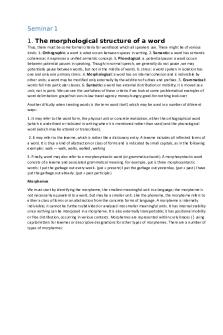Word Formation rules - preparación para el examen del Use of English (First Certificate) PDF

| Title | Word Formation rules - preparación para el examen del Use of English (First Certificate) |
|---|---|
| Course | Inglés First |
| Institution | UNED |
| Pages | 3 |
| File Size | 124.3 KB |
| File Type | |
| Total Downloads | 72 |
| Total Views | 131 |
Summary
preparación para el examen del Use of English (First Certificate)...
Description
Word Formation Overview There are many word beginnings (prefixes) and word endings (suffixes) that can be added to a word to change its meaning or its word class. The most common ones are shown here, followed by examples of how they are used in the process of word formation. More can be found in the Longman Dictionary of Contemporary English.
Verb Formation The endings ize and ify can be added to nouns and adjectives to form verbs. Noun
+ ize
= Verb
American
+ ize
= Americanize
Legal
+ ize
= legalize
This will make the factory more modern. This will modernize the factory. Adjective
+ ize
= Verb
False
+ ify
= Falsify
Humid
+ ify
= humidify
These tablets make the water pure. They purify the water.
Adverb Formation The ending ly can be added to most adjectives to form adverbs. Adjective
+ ly
= Adverb
Easy
+ ly
= easily
His behaviour was stupid. He behaved stupidly
Noun Formation The endings er, ment, and ation can be added to many verbs to form nouns. Verb
+ er
= Noun
Fasten
+ er
= faster
Open
+ er
= opener
Word Formation Last updated: September 14, 2016
Page 1 of 3
John drives a bus. He is a bus driver. Amaze
+ ment
= amazement
Retire
+ ment
= retirement
Children develop very quickly. Their development is very quick. Admire
+ ation
= admiration
Organize
+ ation
= organization
The doctor examined me. The doctor gave me an examination. The endings ity/ty and ness can be added to many adjectives to form nouns. Stupid
+ ity
= stupidity
Don’t be so cruel. I hate cruelty
Adjective Formation The endings y, ic, ical, ful, and less can be added to many nouns to form adjectives. The ending able can be added to many verbs to form adjectives. Noun
+y
= Adjective
Dirt
+y
= dirty
That was an awful smell. It was very smelly. Atom
+ ic
= atomic
That was a book of poetry. It was a poetic book. Hope
+ ful
= hopeful
His broken leg caused pain. It was very painful. Care
+ less
= careless
The operation didn’t cause pain. It was painless. Verb
+ able
= Adjective
Love
+ able
= lovable
You can wash this coat. It’s washable
Opposites Prefixes added to the front of many words can produce an opposite meaning. un
+ fortunate
= unfortunate
I’m not very happy. In fact I’m very unhappy. Word Formation Last updated: September 14, 2016
Page 2 of 3
In + efficient = inefficient & iIl + literate = illiterate & Im + possible = impossible De + centralize = decentralize Instead of inflating the tire, he deflated it. dis
+ honest
= dishonest
I don’t agree with everything you said. I disagree with the last part. non
+ payment
= non-payment
You are not making any sense. What you are saying is nonsense.
Word Formation Last updated: September 14, 2016
Page 3 of 3...
Similar Free PDFs

Word-formation exercises
- 2 Pages

Word Formation Practice
- 6 Pages

Seminar on word-formation
- 12 Pages

WORD Formation Exercises
- 5 Pages

1- First Page and Certificate
- 2 Pages

Examen word - guia word
- 12 Pages

Matemáticas para el examen del PSA
- 14 Pages

Lenguaje PARA EL EXAMEN
- 4 Pages

Formulario para el examen
- 2 Pages
Popular Institutions
- Tinajero National High School - Annex
- Politeknik Caltex Riau
- Yokohama City University
- SGT University
- University of Al-Qadisiyah
- Divine Word College of Vigan
- Techniek College Rotterdam
- Universidade de Santiago
- Universiti Teknologi MARA Cawangan Johor Kampus Pasir Gudang
- Poltekkes Kemenkes Yogyakarta
- Baguio City National High School
- Colegio san marcos
- preparatoria uno
- Centro de Bachillerato Tecnológico Industrial y de Servicios No. 107
- Dalian Maritime University
- Quang Trung Secondary School
- Colegio Tecnológico en Informática
- Corporación Regional de Educación Superior
- Grupo CEDVA
- Dar Al Uloom University
- Centro de Estudios Preuniversitarios de la Universidad Nacional de Ingeniería
- 上智大学
- Aakash International School, Nuna Majara
- San Felipe Neri Catholic School
- Kang Chiao International School - New Taipei City
- Misamis Occidental National High School
- Institución Educativa Escuela Normal Juan Ladrilleros
- Kolehiyo ng Pantukan
- Batanes State College
- Instituto Continental
- Sekolah Menengah Kejuruan Kesehatan Kaltara (Tarakan)
- Colegio de La Inmaculada Concepcion - Cebu



![[123doc] - oxford-first-certificate-skills-use-of-english-key-106p-pdf môn học](https://pdfedu.com/img/crop/172x258/1nrxe4l4mq2o.jpg)


